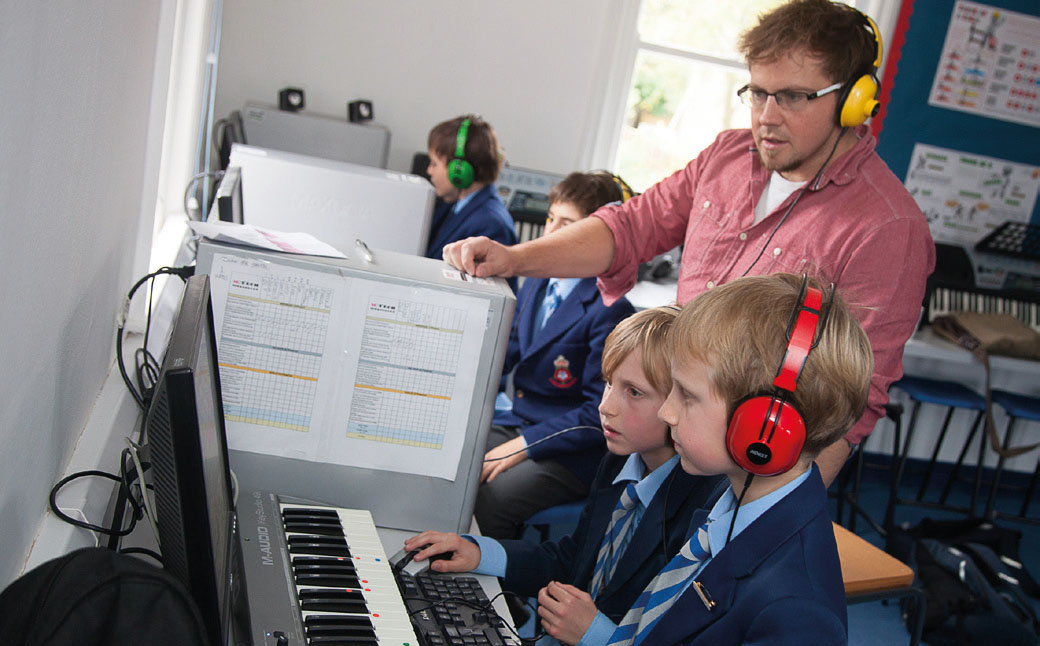
Putting a commitment to music theory and composition at the heart of a primary-level music technology course – and then teaching that on a peripatetic basis – might seem like a high-concept approach to something that is technical enough already. But this commitment is the foundation on which M:Tech – which has grown since 2008 to run programmes in more than 70 primary and prep schools in London and the South East – teaches music, not just music technology.
‘M:Tech is for children to learn to make music using technology as the platform, as opposed to us teaching music technology,’ says M:Tech's education director, Chris Pietrek. ‘Personally, I came from a traditional background. I went to university to study composition and clarinet, and in my final year I chose a mini module on recording. My background up until then had always been orchestras, wind bands and that sort of thing, but I remember being shown a sequencer for the first time: I was blown away by the concept. It was a love of music that I hadn't experienced.
‘From there I went to Kingston University's then Gateway School of Recording to focus purely on music technology. There I came across my old head of music, and she asked if I would like to try teaching music tech to her students at Cranleigh Prep School. I did that for nearly ten years, teaching Cubase in exactly the same way as an instrumental lesson, in two-to-one lessons. And before I knew it I had 80 children in just that one school doing peripatetic music tech composition lessons. It was soon evident that either I was an exceptional teacher, or perhaps that children of that age really took to music tech.’
Having started in independent prep schools, in the last two years M:Tech has moved into provision in the state sector, again using a peripatetic model, through Richmond Music Trust. In Spring 2016, they and the hub presented to primary music coordinators, and M:Tech now works in 14 Richmond schools as well. It's an area in which the company intends to grow, says director Khaled Abdullah: ‘This is proving a really good model for us, because whereas the prep schools each have an individual door to knock on, these teachers were all looking at it together. So the next day we had several calls.’
The right teachers
‘The biggest challenge for us is certainly finding good people to work with,’ says Abdullah. ‘We stand or fall based on the quality of our tuition, and the quality of that tuition is determined by the quality of the teachers. We're very fortunate that we've got a strong team. Initially we were turning over every stone that we could to find teachers, but we've recently got more forensic about what we want. So we've connected up with university course leaders – for example the Royal Academy of Music and their composition courses – and we're now seeing people being referred to us all the time.
‘First and foremost, we are looking for traditional musicians and composers who have come to sequencing as a result of that, rather than somebody who is purely driven by sequencing. And we're always keen that that comes across, that what we're teaching is traditional music theory, curriculum-linked music, and we just happen to be using a sequencer to teach it.’
Why theory?
Why is theory so central to the company's approach? ‘I would say that we see music theory as the foundation of being able to make music,’ says Pietrek. ‘I meet so many people who make music but didn't get a traditional grounding – and I can see how you easily can do that, more so now than ever – but I hear a lot of people say that they wish they'd paid more attention in their music lessons, or that they knew more about harmony. There is a certain amount that you don't necessarily need but is a really useful tool to have in the toolbox.’
Pietrek has recently been developing an online sequencer for pupils to use: ‘What we're doing is effectively an instrument – it just so happens that our instrument is a computer with a midi keyboard, and they're learning composition – so it's important to be able to practice. We're not trying to create something that competes in the marketplace, it's just a musical sketchpad. It means that if children have been working on drums in their lesson, they can practice on M:Studio at home during the week. So it's a sort of idiot's guide to a DAW.’
In a similar way, M:Tech are also developing a simple set of VST sound libraries – plugins that can be used on a range of DAWs – specifically designed for the primary-level children the company works with. ‘Each one will have about 20 instruments, the bread-and-butter sounds that you'd expect for each genre. This is because, firstly, there's a lot of VSTs out there, and they can be very expensive for schools; and secondly, a lot of those that come within sequencers will have all the sounds, but the fact that they have thousands more is actually a bit of a hindrance to the creativity.
‘You want the children to do a piece of music, and some kids could spend weeks scrolling through presets, because they love scrolling through presets! So by restricting the choice you're increasing the productivity. And each instrument will have a paragraph about the instrument written next to it, which you don't really get with most sound libraries, but would be really useful for education.’
‘In a nutshell what we've always been trying to do is introduce a lot of children who haven't had the switch flicked in their traditional music lessons,’ says Pietrek. ‘Quite often M:Tech is what flicks that switch for them.’




